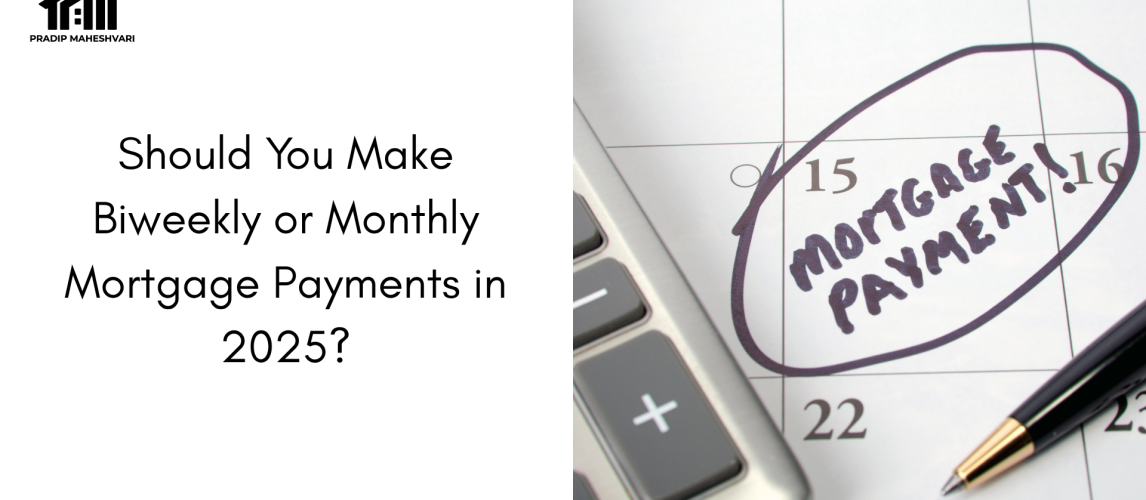If you want to pay off your mortgage faster and save on interest, making biweekly payments is generally a smarter choice in 2025. It allows you to fit in an extra payment every year, reducing both your loan term and total interest cost.
However, if cash flow and simplicity matter more for your financial situation, sticking with a traditional monthly payment can be a better fit. In this guide, we’ll break down both options and help you decide which approach makes the most sense for you.
Understanding Biweekly vs. Monthly Mortgage Payments
At its core, the difference between biweekly and monthly mortgage payments is about frequency. A traditional monthly mortgage involves making 12 payments per year, one for each month.
A biweekly mortgage divides your payment in half and collects it every two weeks. This results in 26 half‑payments per year, or the equivalent of 13 full payments. That one extra payment can make a significant difference over the life of the loan.
For borrowers in 2025, when interest rates and home prices are high, this choice can have long‑term financial consequences. Understanding the nuances of both options is the first step to making an informed decision.
What Are Biweekly Mortgage Payments?
Biweekly payments are structured so you make half of your regular mortgage payment every two weeks. At first glance, this may seem like splitting payments for convenience, but it’s more than that.
Here’s the key: making payments every two weeks results in 26 half‑payments across the year, one more full payment than a monthly schedule. This “extra” annual payment goes directly toward your principal balance, reducing interest over time and potentially shortening your loan term by several years.
Benefits of Biweekly Payments:
- You build equity faster.
- You save on total interest over the life of the loan.
- You can pay off a 30‑year mortgage roughly 4–5 years early.
Potential Drawbacks:
- The higher payment frequency can strain cash flow if your income doesn’t match this schedule.
- Not every loan servicer allows biweekly payments or applies them properly, so it’s important to confirm this option with your mortgage broker.
What Are Monthly Mortgage Payments?
Monthly payments are the traditional approach — one payment due every month. This method offers simplicity and predictability, making it ideal for borrowers with fixed incomes or tight budgets.
While you won’t save as much interest compared to biweekly payments, this approach can work well if your priority is maintaining a comfortable cash flow.
Benefits of Monthly Payments:
- Simpler to track and manage.
- Lower risk of missed payments due to scheduling or cash flow constraints.
- Provides more financial breathing room, especially in uncertain economic times.
Drawbacks:
- You pay more interest over the life of the loan.
- You won’t benefit from making that 13th annual payment.
- Slower build‑up of equity compared to a biweekly plan.
Biweekly vs. Monthly: Cost Comparison for 2025
In an environment of rising interest rates and increasing housing costs, every dollar saved counts. Let’s compare:
For example, assume a 30‑year, $300,000 mortgage at 6.5% interest:
- Monthly payments: roughly $1,896, totaling about $382,786 in interest over the life of the loan.
- Biweekly payments: roughly $948 every two weeks. By making 26 half‑payments per year, you’ll save roughly $30,000 in interest and pay off the loan about 4–5 years early.
The takeaway: Biweekly payments can save significant money and reduce your loan term. However, this only works if your cash flow supports making payments every two weeks.
Factors to Consider When Choosing Between Biweekly and Monthly
Your decision depends largely on your financial situation and priorities:
- Cash flow: Do you have stable income that supports making payments every two weeks?
- Interest rate environment: In 2025, rising interest rates can make biweekly payments an attractive way to save.
- Personal discipline: Will making biweekly payments fit into your financial routine? Will your lender properly apply those payments?
- Future plans: Do you intend to stay in the home long‑term? Biweekly payments have long‑term benefits that matter more if you plan to keep the mortgage for many years.
Frequently Asked Questions
Will making biweekly payments save money in 2025?
Yes. In an environment of rising interest rates, making an extra annual payment can save tens of thousands in interest over the loan’s lifetime.
Are monthly payments better for first‑time buyers?
For first‑time buyers focusing on managing cash flow and overall affordability, monthly payments can be ideal, especially if income doesn’t match a biweekly structure.
Should I consult a mortgage broker?
Absolutely. A mortgage broker like Pradip Maheshvari can review your financial picture, loan terms, and long‑term objectives to recommend the best payment approach for 2025 and beyond.
Conclusion
Choosing between biweekly and monthly mortgage payments is more than a financial decision — it’s about aligning your mortgage strategy with your long‑term goals and daily cash flow.
If you want to save on interest and build equity faster, biweekly payments are an excellent option, especially in a higher‑rate environment. However, if simplicity, cash flow, and predictability matter more, the traditional monthly approach may be better for you.
Need help making the right call? Reach Pradip Maheshvari!
As an experienced mortgage broker, I can review your loan terms, run the numbers, and help you select the best payment structure for 2025, so you can save money, build equity, and achieve your financial goals with confidence.


No comment yet, add your voice below!